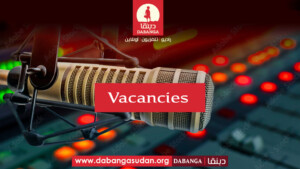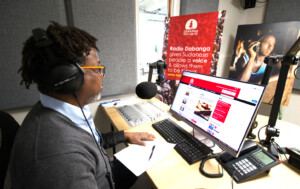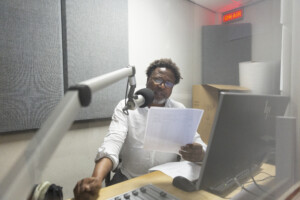Radio Programme Highlight: ‘We empowered people to claim their rights’
Today we’re asking one of the editors, Assadiq Musa, about his favorite Radio Dabanga programme. Fi El Mizan did not shy away from topics considered taboo in Sudanese culture, such as sexual violence.

Today we’re asking one of the editors, Assadiq Musa, about his favorite Radio Dabanga programme. Fi El Mizan did not shy away from topics considered taboo in Sudanese culture, such as sexual violence.
“In 2009, we started a programme for Radio Dabanga in cooperation with the Institute for War and Peace Reporting,” Radio Dabanga news reader and editor Assadiq Musa says. “We wanted it to focus on law issues over three levels – international law, national law and local Darfuri law – in over fifty episodes.”
Fi El Mizan, or ‘On The Scale’, was born. A programme on law does not seem the first topic that comes to mind for people in conflict areas. Assadiq: “When you cover the news or an event takes place in a war area or conflict area, you think about the life of the people there. They have a right to get food, health care, water, and education. We started with the law because we think that there is a lack of information about it in Darfur. We targeted these people to start a discussion on how to get peace through negotiation.
“On the international law level, we focused on the accusation which came from the ICC against the Sudanese president. At that time we invited experts in law and politics to explain to our listeners what a crime against humanity means, what a war crime is, and what genocide as a crime means.
“On the second level, we discussed how the government of Sudan used rape and hunger as a weapon of war with experts and people from the ICC itself. We made seven episodes about rape, starting with victims who were willing to speak about it in private.
Informing victims
“Because of the taboo surrounding rape, we discussed it at length with some victims until we reached a point that they were willing to speak about what happened to them through Radio Dabanga. This way, the programme was able to inform victims and others on how to get medical treatment or how to find justice. Lawyers and law experts from Sudan also appeared in Fi El Mizan. They discovered problems in the law which hinders women victims of rape in filing a report with the police or in going to court.
“There was a third, local level in the programme where we spoke about transitional justice as something that could take place in the future. Something that they can use in their benefits, when there are problems between tribes or between civilians in a remote area.
“For me, Fi El Mizan was very big. By creating awareness about rights we let people start to discuss how they can defend their rights.
We do positive things and we are proud of that.
“In addition, we also wanted to send this news to the international community to show the extent of human rights abuses in the area. And to show everyone that the solution to all problems can come through respect of the law, whether it is local, national, or international. But if a law is not good you must strive to change it and solutions come when you start to discuss those problems.”
Fi El Mizan strives to cover the topics in a neutral way and in doing so, embodies Radio Dabanga, Assadiq explains. “Dabanga is the only media that covers the conflict in Darfur from a neutral point: we are far away from the authority of the Sudanese regime. As we are here in the Netherlands, we have space for freedom and we did what we think is our obligation to do as journalists. Many people told us that Radio Dabanga became a way to hope. We do positive things and we are proud of that.”
A reduction of our shortwave airtime means that the stories of Sudanese people, like those covered in Fi El Misan, will not be heard. You can support Assadiq in giving a voice to the people in Sudan. Share this story online, or sponsor two minutes of Radio Dabanga’s broadcasting airtime for 10 euros on GoGetFunding. Help keep these radio programmes on air!












 and then
and then